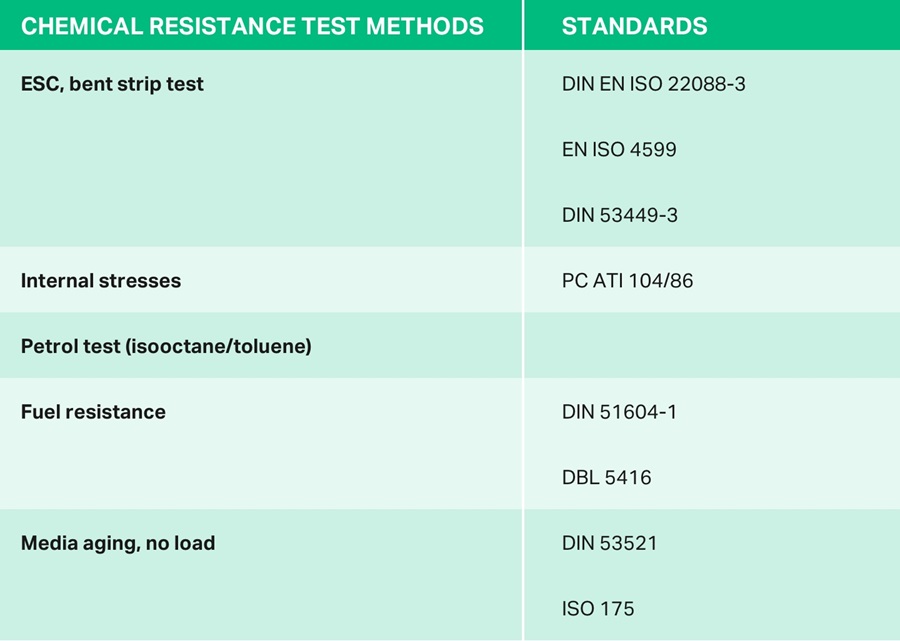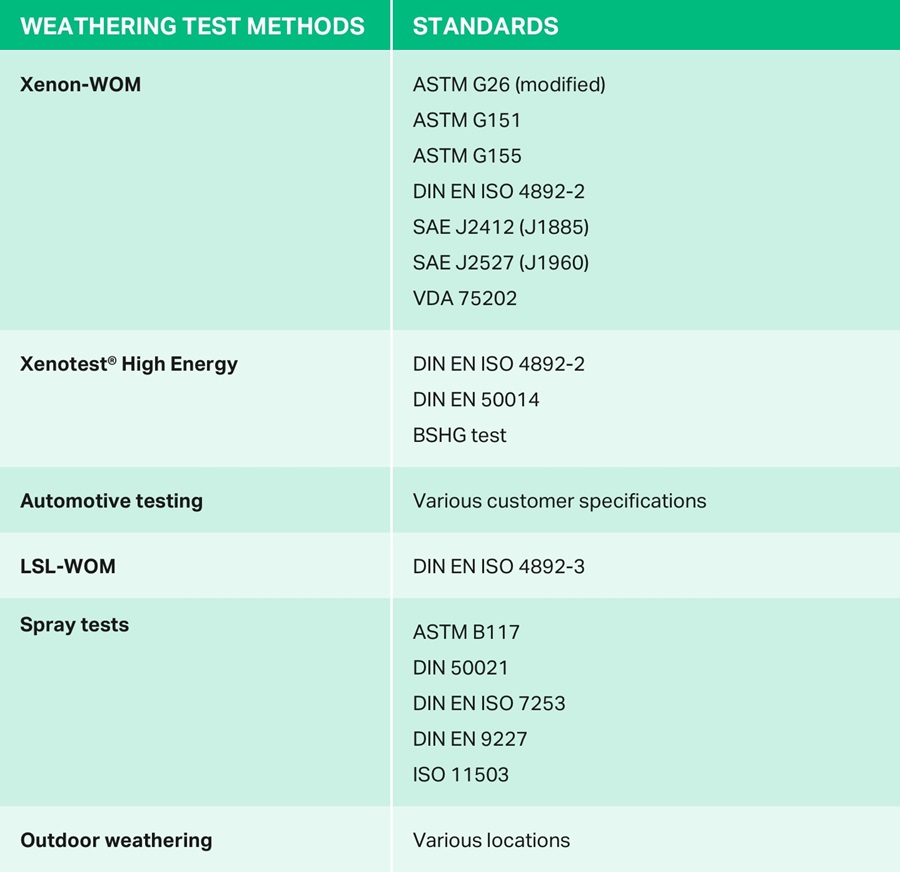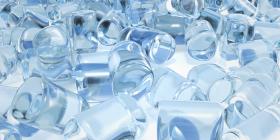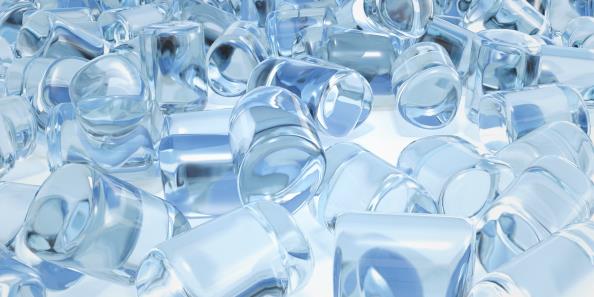
Technology
Chemical properties
When selecting a plastic for a specific application, it is important to consider the material’s resistance to the media it can be expected to come into contact with and its resistance to environmental conditions.
Featured Brands
- Thermoplastic polyurethanes
Relevant chemical properties when choosing a material include chemical resistance, especially resistance to specific media such acids and alkaline solutions, saturated hydrocarbons, aromatic hydrocarbons, lubricating oils and greases and solvents. Further chemical properties include a material’s resistance to microbes, hydrolysis, UV and high-energy radiation and ozone.
General chemical resistance
Due to their widely varying chemical structure, Desmopan® grades can behave in very different ways towards chemicals. Polyether-based products display fundamentally different behavior from those based on polyesters, and hardness can also play a role. In addition, external conditions, such as temperature, concentration, and the duration of exposure to the media, will naturally also have a major impact on chemical resistance.
If the resistance of Desmopan® to specific mixtures of substances is not clear, we recommend special testing to determine how the material behaves on a mechanical level when aged in the medium in question. When Desmopan® comes into contact with chemicals, this generally results in swelling and/or chemical reactions, coupled with degradation of the material. The swelling involves the absorption of what are generally low-molecular substances by the TPU – a process which is reversible, since the molecule chains are not damaged. Dimensional changes can, however, occur, together with a deterioration of the material’s mechanical properties. In extreme cases, the TPU will dissolve.
If the resistance of Desmopan® to specific mixtures of substances is not clear, we recommend special testing to determine how the material behaves on a mechanical level when aged in the medium in question. When Desmopan® comes into contact with chemicals, this generally results in swelling and/or chemical reactions, coupled with degradation of the material. The swelling involves the absorption of what are generally low-molecular substances by the TPU – a process which is reversible, since the molecule chains are not damaged. Dimensional changes can, however, occur, together with a deterioration of the material’s mechanical properties. In extreme cases, the TPU will dissolve.
Resistance to specific media
Thermoplastic polyurethanes have a widely varying response to different media. Below is an overview of their general response to a number of categories.
Acids and alkaline solutions
Concentrated acids and alkaline solutions attack and decompose Desmopan® products, even at room temperature. Desmopan® displays a very limited resistance to acids and to alkaline solutions in low concentrations.
Saturated hydrocarbons
TPUs swell slightly in saturated hydrocarbons such as diesel oil, isooctane, petroleum ether and kerosene. This response can lead to a 20 to 30% drop in their tear resistance. More flexible products swell to a greater extent than rigid products, but this swelling is reversible.
Aromatic hydrocarbons
Aromatic hydrocarbons such as benzene and toluene cause pronounced swelling and a reduction in mechanical properties even at room temperature.
Lubricating oils and greases
TPUs are stable, even at high temperatures (up to 100°C, depending on their hardness) when in contact with the test oils ASTM 1, IRM-902 and IRM-903. Many of the lubricants employed in practice, however, are preparations with additives that damage TPU. Immersion tests are essential here. Metallic soaps, in particular, tend to produce critical reactions.
Solvents
Aliphatic alcohols, such as ethanol and isopropanol, cause TPU to swell slightly. TPUs undergo pronounced swelling in ketones such as acetone, methyl ethyl ketone (MEK) and cyclohexanone, as well as in aliphatic esters such as ethyl acetate and butyl acetate. Polar organic solvents such as dimethyl formamide (DMF), dimethyl sulfoxide (DMSO), N-methylpyrrolidone and tetrahydrofuran (THF) dissolve TPU.Thermoplastic polyurethanes have a widely varying response to different media. Here is an overview of their general response to a number of categories.
Acids and alkaline solutions
Concentrated acids and alkaline solutions attack and decompose Desmopan® products, even at room temperature. Desmopan® displays a very limited resistance to acids and to alkaline solutions in low concentrations.
Saturated hydrocarbons
TPUs swell slightly in saturated hydrocarbons such as diesel oil, isooctane, petroleum ether and kerosene. This response can lead to a 20 to 30% drop in their tear resistance. More flexible products swell to a greater extent than rigid products, but this swelling is reversible.
Aromatic hydrocarbons
Aromatic hydrocarbons such as benzene and toluene cause pronounced swelling and a reduction in mechanical properties even at room temperature.
Lubricating oils and greases
TPUs are stable, even at high temperatures (up to 100°C, depending on their hardness) when in contact with the test oils ASTM 1, IRM-902 and IRM-903. Many of the lubricants employed in practice, however, are preparations with additives that damage TPU. Immersion tests are essential here. Metallic soaps, in particular, tend to produce critical reactions.
Solvents
Aliphatic alcohols, such as ethanol and isopropanol, cause TPU to swell slightly. TPUs undergo pronounced swelling in ketones such as acetone, methyl ethyl ketone (MEK) and cyclohexanone, as well as in aliphatic esters such as ethyl acetate and butyl acetate. Polar organic solvents such as dimethyl formamide (DMF), dimethyl sulfoxide (DMSO), N-methylpyrrolidone and tetrahydrofuran (THF) dissolve TPU.Thermoplastic polyurethanes have a widely varying response to different media. Here is an overview of their general response to a number of categories.
Chemical resistance testing methods
The Thermoplastics Testing Center (TTC) offers the following chemical resistance tests:

Microbial resistance
Under unfavorable conditions (hot climate, high humidity, soil contact), flexible polyester-based TPU can be attacked and decomposed by fungi and bacteria. The ester bonds are split by enzymes in the microorganisms, and low-molecular building blocks result. Attacks of this type are frequently visible in the form of discoloration and the subsequent formation of cracks in areas of the parts subjected to mechanical load. A certain amount of protection can be achieved through the addition of microbicides. Polyether bonds, in contrast, are better equipped to handle microbial enzymes. Thermoplastic polyether-based polyurethanes and rigid polyester TPU are inherently resistant to microbe attacks.
Hydrolysis resistance
At high temperatures and with a high humidity, flexible TPUs based on polyesters display a certain susceptibility to hydrolysis. Water molecules then split the ester groups, and the molecular weight decreases considerably, thus leading to reduced mechanical properties. Flexible polyester TPUs rarely fail in practice. All of our general-purpose Desmopan® grades contain effective stabilizers; however, these are not required for ether grades.
Radiation resistance
UV radiation
As with all polymers, TPUs are attacked by UV radiation. In the case of general-purpose products, exposure to UV radiation leads to clear yellowing at the surface; however, there is virtually no deterioration in mechanical properties. TPUs based on aliphatic diisocyanates do not display any yellowing due to UV radiation.
The extent of yellowing and the impairment of mechanical properties can be slowed down considerably through the addition of appropriate light stabilizers. Desmopan® grades that already contain these agents are available, as are masterbatches which can be added as and when required. During weathering tests that run for prolonged periods, degradation phenomena due to UV radiation and hydrolysis can be superimposed on each other.
High-energy radiation
Desmopan® has an outstanding resistance to α, β and γ radiation.
As with all polymers, TPUs are attacked by UV radiation. In the case of general-purpose products, exposure to UV radiation leads to clear yellowing at the surface; however, there is virtually no deterioration in mechanical properties. TPUs based on aliphatic diisocyanates do not display any yellowing due to UV radiation.
The extent of yellowing and the impairment of mechanical properties can be slowed down considerably through the addition of appropriate light stabilizers. Desmopan® grades that already contain these agents are available, as are masterbatches which can be added as and when required. During weathering tests that run for prolonged periods, degradation phenomena due to UV radiation and hydrolysis can be superimposed on each other.
High-energy radiation
Desmopan® has an outstanding resistance to α, β and γ radiation.
Ozone resistance
The ozone resistance of a material plays a key role in the rubber industry, since a large number of elastomers contain double bonds, which can be split by ozone with its strong oxidizing effect. Desmopan® grades display very good resistance to ozone. No embrittlement is observed. The ozone resistance of a material plays a key role in the rubber industry, since a large number of elastomers contain double bonds, which can be split by ozone with its strong oxidizing effect. Desmopan® grades display very good resistance to ozone. No embrittlement is observed.
Weathering test methods
The Thermoplastics Testing Center (TTC) offers the following weathering tests:


















